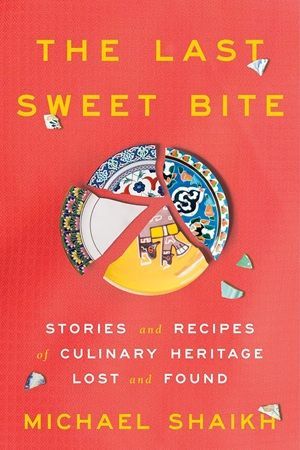This content contains affiliate links. When you buy through these links, we may earn an affiliate commission.
The Last Sweet Bite is a simultaneously informative, heartbreaking, and inspiring read. Michael Shaikh is a writer (but not a “food writer) who, through his work as a human rights investigator, has noticed the powerful threads between cultures and food and the violence that severs these ties. Yes, this book is about food, but it is also about extreme violence that happened in the past and is still occurring today. This book absolutely punched me in the face with my ignorance. I was completely unfamiliar with much of what was discussed, including ongoing genocides—I learned so much by reading this.

The Last Sweet Bite: Stories and Recipes of Culinary Heritage Lost and Found by Michael Shaikh
The violence described in this book is balanced by an abundance of hope. Many of the people interviewed are not only fighting to save their culture, but specifically holding tight to their cultural recipes and ingredients lest they be lost, forgotten, or destroyed.
There are six meaty chapters in this book. The author starts with the Czech Republic and how communism attempted to obliterate that culture, especially through food. I had no idea that the regime forced all restaurants to serve the same, uninteresting food—but I was enamored by the little thefts that everyone performed to make it all bearable.
Another chapter was on Myanmar, Bangladesh, and Rohingya food. I was shocked to learn about how the leader of Myanmar was granted the Nobel Peace Prize while still committing horrible atrocities. I’m still struggling to wrap my head around this chapter because hearing the stories just tore my heart open. Of course, a person cannot write a book on this subject without talking about China and the Uyghurs and Sri Lanka and the Tamil Diaspora. The author ties everything back to food nicely, but makes it clear that the food and the people are inextricably connected.
I was fascinated by reading about the coca plant in Bolivia and how it’s so harshly regulated because of drug laws. There was a line that explained that the chance of you getting high from eating a dish made with the coca plant is the same as you getting drunk from eating grapes.
Finally, of course, the author brings it closer to home for the U.S. by talking about the Pueblo Nations’ culinary heritage. I remember reading Braiding Sweetgrass by Robin Wall Kimmerer and learning about the three sisters: beans, corn, and squash, but not until The Last Sweet Bite did I learn about the fourth sister: amaranth.
Audiobooks Promotions
Sign up for Audiobooks Promotions to receive special offers, new products, and interesting listens from the world of audiobooks!
This book was a heavy read that left me both informed and hopeful.
That’s it for now, book-lovers! Find me on Book Riot, the All the Books podcast, Bluesky, and Instagram.
Find more books by subscribing to Book Riot Newsletters.